1) Introduction:
Populism especially in contemporary times is an anti-elitist, anti pluralist and an exclusive form of political ideology. Since these values are antithetical to the liberal values, populism poses a major threat to the liberal world order.
2) Framing the Issue Defining Key Variables
2.1) Populism: an anti-elitist, anti-pluralist and exclusive form of political ideology (Jan Werner Muller)
2.2) Different strands of the Liberal World Order
- Democratic culture
- Capitalism
- Free Trade
- Pluralism
- Collectivism
3) Rise of Populism across the Globe
- Trump’s surge to popularity
- Brexit
- India under Modi
- Proliferation of populist parties throughout Europe
4) How Populism Poses a Threat to The Liberal World Order
4.1) threatens the notion of multilateralism
Case in point: Trump’s withdrawal from the Iran Nuclear Deal
5) Conclusion:
Populism poses a grave threat to liberalism. Hence, it is a crying need of the hour for the world to get together and tame populist tendencies in order to preserve the liberal world order.
Essay
The Cold War, which dominated international politics for several years, ended with the dismemberment of the U.S.. It became touted as a major victory of capitalism, which was spearheaded by the United States of America. The communist ideology, in line with diverse students, stood defeated with the Soviet defeat. One such pupil changed into Francis Fukuyama. In his “stop of History” thesis, Fukuyama stipulated that the end of the bloodless war was the end of mankind’s ideological evolution. According to him, the occasion marked the triumph of the liberal capitalist ideology because it was the best shape of ideology. By virtue of being the first-rate ideology, Fukuyama contended, it would be replicated by almost all countries of the world. Some years later, his perception stands challenged. Rise of populism in America and the proliferation of populist parties at some point in Europe is pretty reported. This fashion implies that the very architects of the liberal world order are threatening to undo the values that the ideology stood for. Populism specifically in present day times is an anti-elitist, an anti pluralist and a distinctive shape of political ideology. Since those values are antithetical to the liberal values, populism poses a primary danger to the liberal global order.
The essay will start out by deciphering the word populism. It will then make an attempt to outline what values are espoused by using the liberal global order. Once this is accomplished, the focal point of this essay will then shift to elucidating with the useful resource of examples and illustrations how populism poses a risk to the liberal world order. Eventually, sure reasons accounting for the upward push of populism during the west may be mentioned. The dialogue will then be folded up by way of offering a fix of treatments required to guard the liberal global order with the aid of taming populist tendencies. Explaining populism is by no means an easy task, Throughout history, the term has been used in different contexts. Simply defined, populism is an ideology that is predicated on appeal to the masses as means to come to power. Populist leaders offer simple answers to complex problems. They usually blame free trade and mass migration for the growing inequality in the world. Modern populists often take this approach as they tap into the backlash against immigration in a globalized economy that many voters feel has left them behind. According to some authors, there are three core requirements for populists to be considered populists.
“Populism is an anti-elitist, anti-plural and exclusive form of political ideology predicated on appeal to the masses.” (Jan Werner Muller)
Liberal global order is an all encompassing time period. Following the dissolution of the Soviet Union, the world became uni-polar. Hence, the west, broadly speaking spredheaded by using America of America, put forth a set of rules that could govern the political, economic and social affairs of the sector. This international order came to be referred to as the liberal global order. Some key tenets on which the sector order is primarily based are: democratic tradition; capitalism; loose change; pluralism; multilateralism and collectivism. In a nutshell, globalization and democracy are at the heart of the liberal world order. Before discussing how populism undermines the liberal global order, it’s worthwhile to establish that populism is quickly taking roots inside the west. President Trump’s sudden surge to popularity is a first-rate instance of the upward thrust of populism within the United States that championed liberal values. Moving on, Brexit is also a populist phenomenon. Masses in Britain have been uneasy with the concept of ‘outsiders’ taking ‘their’ jobs in the U.K. Moreover, the elderly phase of Britain has ended up more culturally conscious in the wake of unabated globalization. Hence, inside the vote, around fifty two percent of humans voted for Britain to break far from the European Union. Narendra Modi is every other populist leader who has grown to be infamous across the world for his populist schedule, which spells disaster for minorities. Finally, populist parties have proliferated at some stage in Europe: Marine Le Pen’s France National Front and Germany’s Alternative for Germany are such parties that show how populism is gaining ground in international locations that once epitomized liberal values.
Firstly, populism threatens the perception of multilateralism, that’s an element that is at the coronary heart of the liberal international order. Simply placed, multilateralism refers to cooperation among international locations for achieving commonplace dreams. In a globalized international, exquisite importance is attached to cooperation as a means to cope with troubles of worldwide concern. The UN charter calls upon states to lodge a diplomatic decision of disputes and multilateralism is one such example. However, it’s a pity that populist leaders exhibit individualistic dispositions in preference to collectivism. In an attempt to position their respective nations first, they flip a blind eye to the overall welfare of the worldwide society. An example that deserves mention here is that of Trump’s withdrawal from the Iran Nuclear Deal. The deal brokered among the everlasting members of the United Nations Security Council plus Germany on one side and Iran alternatively. The deal, usually called the Joint Comprehensive Plan of Action, became hailed as the triump;h of multilateral diplomacy. According to the deal, Iran could roll back its nuclear programme to go back for a lifting of sanctions imposed on the US Iran held its quit of the good deal. However, Trump unilaterally scrambled the deal by way of refusing to certify the Joint Comprehensive Plan of Action. This is one important instance that shows how populism in contemporary instances is undermining the liberal international order.
In conclusion, it may be inferred that the rise of populism is a major challenge to the liberal international order. Populist leaders are slowly but gradually moving the world towards de-globalization. This is a grave predicament since it is likely to erode the liberal values such as free trade, pluralism, multilateralism and collectivism. The situation warrants immediate attention in order to preserve the liberal world order. While this might be difficult, it is certainly achievable through concerted efforts of different nations. Democratizing global institutions and addressing the issue of economic inequality the world over are the keys to success.


